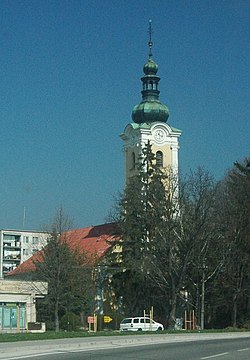Stará Turá
Stará Turá Stará Rurá | |
|---|---|
Town | |
 The catholic church of the Assumption of the Virgin Mary in Stará Turá | |
Location of Stará Turá in the Trenčín Region | |
| Coordinates: 48°46′36″N 17°41′46″E / 48.77667°N 17.69611°E | |
| Country | Slovakia |
| Region | Trenčín |
| District | Nové Mesto nad Váhom |
| First mentioned | 1392 |
| Area | |
| • Total | 50.94 km2 (19.67 sq mi) |
| (2022) | |
| Elevation | 386[2] m (1,266[2] ft) |
| Population | |
| • Total | 8,486 |
| • Density | 170/km2 (430/sq mi) |
| Time zone | CET (UTC+1) |
| • Summer (DST) | CEST (UTC+2) |
| Postal code | 916 01[2] |
| Area code | +421 32[2] |
| Car plate | NM |
| Website | www.staratura.sk |
Stará Turá or Stará Rurá (German: Alt-Turn, Hungarian: Ótura) is a town in the Trenčín Region in western Slovakia.
Geography
[edit]It is located in the Myjava Hills close to the Little Carpathians as well as the White Carpathians. It is situated 11 km (6.84 mi) from Nové Mesto nad Váhom to the west, 12 km (7.46 mi) from Myjava to the east and around 99 km (61.52 mi) from Bratislava to the north and has a population of 8,832 (2018) with an area of 50,942 km2 (19,668.82 sq mi).
History
[edit]The first written record about Stará Turá was in 1392, as a village belonging to the Čachtice Castle. It was part of it until feudalism ceased to exist in the Austro-Hungarian Empire, the Kingdom of Hungary.
In 1467, Matthias Corvinus promoted Stará Turá to the servile town (oppidum), boosting the town's economy. In 1848, the town was nearly destroyed by fire.
It is mentioned in the popular folk song Teče Voda, Teče.
Before the establishment of independent Czechoslovakia in 1918, Stará Turá was part of Nyitra County within the Kingdom of Hungary. From 1939 to 1945, it was part of the Slovak Republic.
Demographics
[edit]| Year | Pop. | ±% |
|---|---|---|
| 1970 | 7,477 | — |
| 1980 | 9,004 | +20.4% |
| 1991 | 10,813 | +20.1% |
| 2001 | 10,291 | −4.8% |
| 2011 | 9,404 | −8.6% |
| 2021 | 8,724 | −7.2% |
| Source: Censuses[4][5] | ||
According to the 2001 census, the town had 10,291 inhabitants. 97.4% of inhabitants were Slovaks, 1.7% Czechs and 0.2% Roma.[6] The religious make-up was 45.5% Lutherans, 27.3% Roman Catholics and 23.6% people with no religious affiliation.[6]
Education
[edit]Secondary Industrial School is located in the city.
Notable people
[edit]- Viliam Vagač (1909–1970), SDB, Roman Catholic priest and religious prisoner (sentenced to 18 years in prison).[7]
Twin towns – sister cities
[edit]Stará Turá is twinned with:[8]
 Kunovice, Czech Republic
Kunovice, Czech Republic
References
[edit]- ^ Statistical Office of the Slovak Republic (www.statistics.sk). "Hustota obyvateľstva - obce". www.statistics.sk. Retrieved 2024-02-08.
- ^ a b c d "Základná charakteristika". www.statistics.sk (in Slovak). Statistical Office of the Slovak Republic. 2015-04-17. Retrieved 2022-03-31.
- ^ Statistical Office of the Slovak Republic (www.statistics.sk). "Počet obyvateľov podľa pohlavia - obce (ročne)". www.statistics.sk. Retrieved 2024-02-08.
- ^ "Statistical lexikon of municipalities 1970-2011" (PDF) (in Slovak).
- ^ "Census 2021 - Population - Basic results". Statistical Office of the Slovak Republic. 2021-01-01.
- ^ a b "Municipal Statistics". Statistical Office of the Slovak republic. Archived from the original on 2007-11-16. Retrieved 2007-12-09.
- ^ KUBANOVIČ, Zlatko: Historický náhľad do dejín slovenských saleziánov (Od dona Bosca do roku 1924). Bratislava : Don Bosco, 2019. ISBN 978-80-8074-436-6. p. 283–284.
- ^ "Úvodná strana". staratura.sk (in Slovak). Stará Turá. Retrieved 2019-09-04.
External links
[edit]![]() Media related to Stará Turá at Wikimedia Commons
Media related to Stará Turá at Wikimedia Commons



